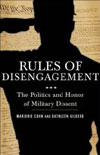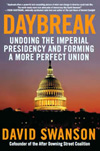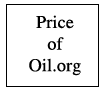Abboud and “Toxic Bob” Waiting for the New Oil Law to Pass
Buah Bail Out Pal Drooling for Iraqi Oil
By Nick Mottern, Director, ConsumersforPeace.org
While blood is flowing freely in Iraq’s streets, A. Robert Abboud, a man who helped bail George W. Bush out of his Harken Energy fiasco, is angling for a contract that will give his firm, Ivanhoe Energy Inc., access to a major oil field in north central Iraq.
Mr. Abboud, who runs his own investment company and who has been president of Occidental Petroleum (1980-84), chairman of the First National Bank of Chicago (1975-80) and chairman and CEO of First City Bancorporation of Texas (1988-91), is co-chairman at Ivanhoe Energy and appears to be acting as the firm’s diplomatic frontman in going after the Iraqi oil.
He has experience in Iraq, working in concert with the administration of Bush senior to promote trade with Iraq under Saddam Hussein, acting in the 1980s as chairman of the United States-Iraqi Business Forum. In this role he worked with Henry Kissinger’s consulting firm and major U.S. companies that were clients of the Kissinger firm, according to a fascinating statement presented to Congress in 1991 by Cong. Henry Gonzalez D-TX, who said Mr. Abboud, because of his executive experience, “was well-wired into the U.S. business community.”
With respect to trade promotion to Iraq in the 1980s, Congressman Gonzales said:
“A foreign policy (toward Iraq) based on commercial trade had the advantage of providing Iraq with high quality food and United States technology to upgrade its military capability in order to defeat Iran…
“In order for this trade based-foreign policy to work, the United States had to ignore a few Iraqi bad habits including massive human rights abuses, the imprisonment, torture and execution of political prisoners, an almost complete lack of democracy, the use of poison gas against Iraq’s own Kurds, the use of poison gas against the Iranians, state-sponsored terrorism, making refugees out of over 100,000 Kurds, the execution of a foreign journalist, continual debt service problems, rampant fraud in the CCC (U.S. loans to buy food) program, and the diversion of United States technology to improve Iraqi nuclear, chemical and biological weapons capability…”
Speaking to investors and the business press in an Ivanhoe conference call on April 20, 2007, Mr. Abboud reassured his listeners that he had experience in violent situations like Iraq. He referred to what he said was the success of Occidental in entering Colombia at a time when guerrilla warfare and drug trading created dangerous conditions. He neglected to add that Occidental, according to the website World War 4, lobbied the U.S. “to expand its role in Colombia, allowing military aid to be used for pipeline protection. This year (2002) President (George W.) Bush’s administration has complied, proposing $98 million to protect the duct.”
He did not note either that, according to the U.S. General Accountability Office (www.gao.gov/new.items/d05971.pdf) , the new U.S. military aid, which as of 2005 included 10 helicopters, logistics support and U.S. Special Forces training of Colombian troops, had not fully suppressed attacks on the major Cano Limon pipeline, with “insurgents” changing their tactics to include sabotage of the electrical grid for the Cano Limon oil field. The GAO report recommended that the U.S. develop “a plan for transitioning the pipeline security program to Colombia” and also that there be established “an expected completion date for U.S. involvement.”
The GAO report noted that Occidental has given money to the Colombian military “for housing, food, land and air transportation, communication equipment, gasoline, and medical equipment” as well as building barracks for soldiers on an army base. Occidental has been charged with assisting the Colombian air force in a 1998 cluster bomb attack that killed 17 civilians near Cano Limon, including 7 children, in a federal lawsuit on behalf of a man whose mother, sister and cousin died in the attack and others. The case was dismissed two years ago based on the argument of the U.S. State Department that the suit interfered with U.S.-Colombia relations. The case is being appealed in the 9th Circuit Court of Appeals.
Human Rights Watch reports that in 1996 Occidental “formalized a voluntary assistance arrangement in which it has previously engaged with the Colombian military” to provide $2 million one-year inkind and cash payments to the military, with cash to be used for, among other things, a “network of informants.” The report said that guerrilla attacks had “driven the (oil) companies into the arms of the Colombian military, one of the few in the hemisphere still engaged in a pattern of gross violations of human rights.” (www.hrw.org/advocacy/corporations/colombia.Oilpat.htm)
Nor did Mr. Abboud mention that, after his tenure as Occidental’s president, the company met opposition from Colombia’s Uwa indigenous people who fought the company from 1992 to 2002 and in 1995 threatened mass suicide by jumping off a 1,400 foot cliff in the Andes if the company didn’t leave their region. In 2000, three Uwa children were killed when Occidental called on the military to clear an Uwa blockade to a drill site, reported WW4, which said Occidental eventually left the region,”citing technical and economic reasons” and denying that the protests had any effect.
The Occidental agreements with the Colombian military and the struggle with the Uwa occurred in part during the period when Ivanhoe Energy’s other co-chair, David R. Martin, was president and CEO of Occidental Oil and Gas Corporation, Occidental Petroleum’s exploration and development subsidiary working in Colombia. Mr. Martin joined Occidental in 1962, and according to a company press release, he became president of its international oil and gas unit in 1983. In 1986, he was appointed Executive Vice President of the parent corporation and in 1993 he became president and CEO of the oil and gas unit in 1993 and was named to the board of Occidental in 1996, the same year he retired from his operational and board positions. ( An internet search did not reveal whether or to what degree Mr. Martin was involved in the issues raised above. An Ivanhoe spokesperson said she could not comment on actions taken by Occidental and that she would ask Mr. Martin if he wished to comment when he returns next week from a trip.)
Mr. Abboud, in joining Ivanhoe Energy for an annual $250,000 salary and about $1.4 million in stock and stock options, is working with Robert Friedland, Ivanhoe’s largest stockholder, nicknamed “Toxic Bob.” Mr. Friedland is reported by SourceWatch to be worth $1.2 billion, and the website says his “colorful corporate career has included wild speculations on mining futures, spectacular pollution scandals” and willingness to work with the notoriously repressive government of Myanmar (formerly Burma) in a joint venture to develop an extremely profitable copper mine.
Mr. Friedland became known as “Toxic Bob” , according to SourceWatch, after a
“spectacular” 1993 cyanide spill at his gold mine in Summitville, Colorado, reputed to be the largest such disaster in U.S. history. The New Internationalist reports that he “avoided legal responsibility by making a timely resignation.” In addition, SourceWatch reports, Mr. Friedland was CEO of Omai gold in Guyana in 1995 when a tailings pond collapsed, killing life in two rivers. Citing the New Internationalist, Source Watch says: “No reparations at all have been paid here. An ‘independent’ report on the disaster denied any damage, despite news photographs and eyewitness accounts of dead fish, pigs and crocodiles. The mine was a joint venture of the World Bank, the Guyana Government and Freidland’s South American Goldfields. Once again, a timely resignation saved him from legal responsibility.”
Ivanhoe, a relatively small oil development company with a patented process for thinning out thick oil so it can flow easily through pipelines, is facing two hurdles to tapping into Iraq oil wealth.
First, the Iraq Parliament must pass the new, pending oil law, that will open its oil fields to private firms like Ivanhoe, ExxonMobil, Shell, BP and Chevron on extremely favorable terms to the oil companies. Ivanhoe “will closely monitor” the development of the new law, Mr. Abboud said on the conference call. The United States is pushing hard for the immediate passage of this law, and its passage is one of the benchmarks that will be used to determine whether the U.S. will continue to keep troops in Iraq. The oil law is opposed by Iraqi oil union workers and many others.
The second hurdle, once the oil law is passed, is the selection of Ivanhoe by Iraqi officials to develop the field. Mr. Abboud said on the conference call that, in a recent trip to the Persian Gulf, he spoke with Iraqi officials about the oil venture and that he thought that the relationships that Ivanhoe officials have developed with Iraqis would be fruitful. It’s important to remember, he said, that: “It’s their oil. They’re going to be in charge.”
Speaking on the conference call of the oil field in question, the Ivanhoe leaders would not reveal its exact location or size. Leon Daniel, of Ivanhoe, said the field has “huge quantities” of oil, but asked for more specifics, he would only acknowledge that most fields in Iraq are at least a billion barrels in size. It is a “challenging environment”, Mr. Daniel said, “where the prize is big.”
In answer to investor questions about security, he said the field is “far removed from Baghdad” and not in a troubled area; the challenge is “not like securing Baghdad.” He said there are “competent security forces” in the area, with clear lines of sight, and “we can make the work site secure.” He said that the thinned-out oil could be moved from the site in pipelines either south or north through Turkey, a path that would likely be more secure.
Ivanhoe drew attention to the project with an April 19 press release announcing that the Japanese oil and gas firm Inpex Corp. had invested $9 million in it for a 45% share in the proceeds; Ivanhoe will get 55%. The announcement resulted in a jump in the Ivanhoe stock price from a close of $2.32 on April 18 to $2.65 on the 19th. The stock has since settled to $2.21 as of April 25, 2007.
The October 9, 2002 Wall Street Journal (WSJ) reporting on the role of Harvard University in the bailout of Harken Energy, notes that one of the key steps in preventing the failure of Harken was a 1990 agreement by First City Bancorporation of Texas, then headed by Mr. Abboud, to take over Bank of Boston loans to Harken that were technically in default. Mr. Abboud is a graduate of Harvard College, Harvard Law and Business Schools.
“At the time,” the WSJ reports, “one of the Harvard endowment’s most influential board members (identified in the article as oil man Robert Stone Jr.) was a political supporter of then-President George H.W. Bush, the current president’s father. One result of the deal: The current president avoided damaging his credibility as a businessman.”
Leading up to this time, in 1986 Harken Energy agreed to buy failing Spectrum 7 Energy where George W. Bush was chairman. George W. became a board member of Harken, a $100,000 consultant to the company and a member of Harken’s audit board. The WSJ said that right after George W. joined the Harken board, Harvard’s endowment fund began backing Harken, buying its stock. In May, 1990, the WSJ said, Harken officials warned that the company was “about to run out of cash.” In June, 1990, according to an article by Stephen Minkin on CommonDreams.org, George W. sold 200,000 shares of Harken stock “before the price plummeted and while outside investors were unaware of the company’s desperate situation.”
The Common Dreams article goes on to say:
“Mr. Bush later blamed his lawyers and the ‘loss of documents’ by the Securities and Exchange Commission when it was discovered that he failed to disclose the $845,560 sale within the time required by law.”
In August, 1990, First City Bankcorp agreed to take over the Bank of Boston loans.
“At the time,” the WSJ reports, “First City was controlled by Robert Abboud, …(a) supporter of the senior Mr. Bush who attended a White House event 10 days before that bailout’s (First City’s) approval. In an interview, Mr. Abboud said Harvard’s backing was a key factor in First City’s decision to approve the Harken bailout and that it wasn’t influenced by his relationship with the then-president.”
The First City money was not enough to save Harken, so a Harvard partnership assumed $20 million in Harken debt, according to the WSJ, and eliminated another $16 million by transferring Harken assets to Harvard. This move, says the article was “much like the controversial investments that Enron Corp. set up before it filed for bankruptcy-court protection.” In 1991 Harken stock began to recover, and Harvard sold its shares for a profit.
Mr. Bush remained on Harken’s board until 1993 and was paid between $80,000 and $120,000 a year as a consultant from 1986 to 1993, according to thetruthaboutgeorge.com.





